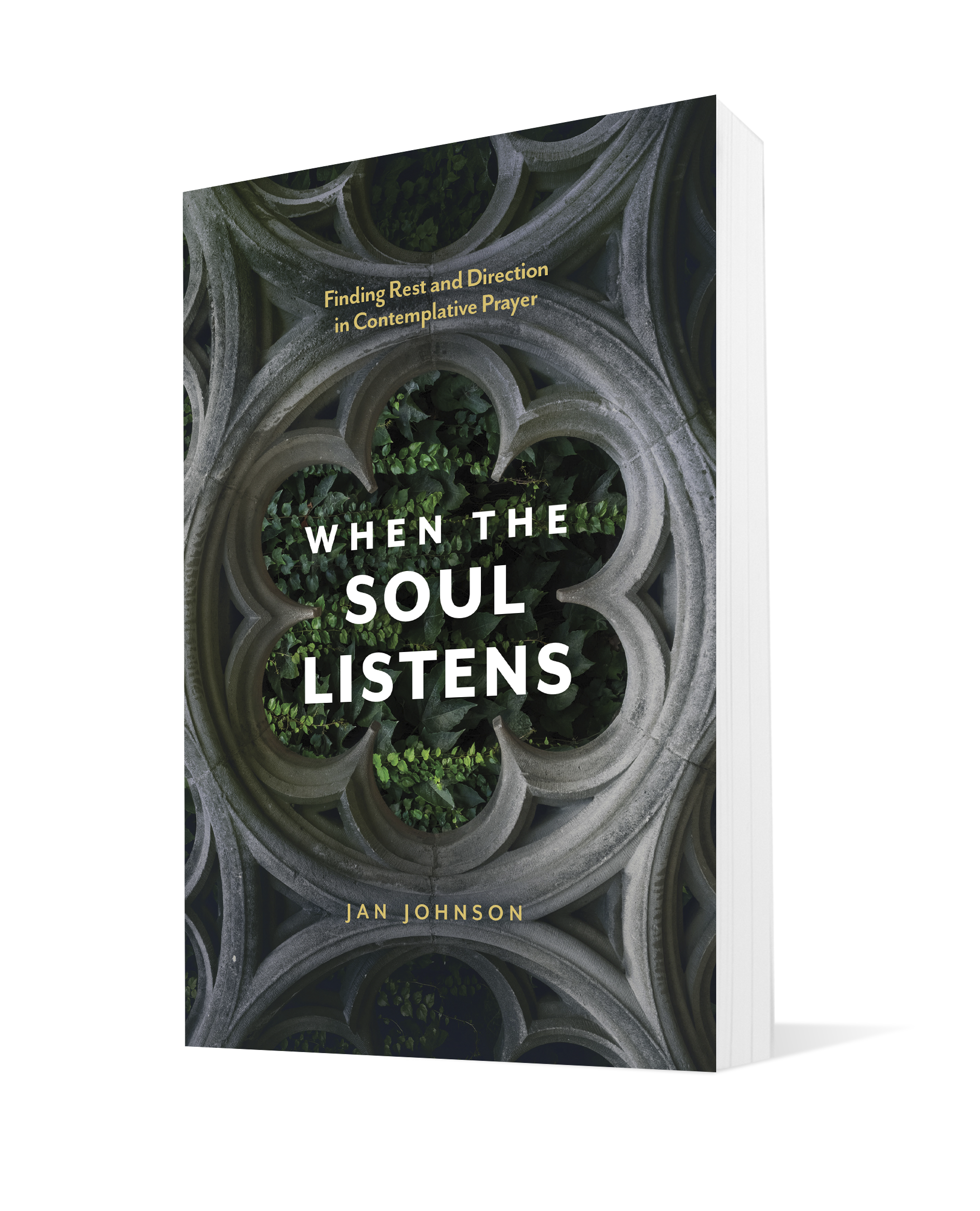I used to have dazzling quiet times. I sat on my bed, holding my four-part prayer notebook as if it were a cherished artifact. Pulling back the tab marked “adoration,” I peered at a list of forty words that described God and picked three to praise God for. Moving on to the tab marked “confession,” I mulled over another forty-word list of faults, especially those I’d underlined in red: laziness and grouchiness. Racing on to “thanksgiving,” I skimmed a list of twenty items I felt thankful for, including friends, relatives, books, and—to be especially spiritual—God Himself.
At the bottom of the page, a stretching zinger challenged me: Thank God for one thing you’ve never thanked Him for before.
Finally, I had enough momentum to slide into home plate—a list of requests I had kept for ten years: former students, weight control, missionary friends. It took quite a while to do this portion of the notebook, but when I finished, I felt as if I’d covered the map with God.
In spite of my spiritual whiz-kid persona, I was crumbling and raging inside. I felt suffocated by the routine life of a stay-at-home mom, the impossibility of church work, and the dry ache of a vanishing marriage. I remember the day my quiet time died. After gathering all my devotional props, I settled into a terrible emptiness. I needed God as I had never needed Him before, but my regimented prayers were puny containers for my anguish. Hurling my prayer notebook across the room, I asked myself, How would I survive life without someone to love me? How could I connect with God so that no matter what happened to me, I would believe that God still loved me and valued me? What would replace these sterile lists so I could sink my teeth into a God who would satisfy my neediness?

As my ego props fell away—ministry positions, marriage security—I replaced my sterling quiet time with reading Glamour magazine. I found refuge in food and snacked all day. Appalled that my secret food compulsion was taking over, I slithered into a room with other “losers” like me—a support group for compulsive eaters. When I said I was “fine,” they laughed and said, “Right! So how are you really doing?” My Christian facade, which I didn’t know I had, cracked.
Over several years, these meetings schooled me in admitting the truth—that I demanded perfection from myself and everyone around me. I saw that I had behaved as a Pharisee, “the one who wants to get the right formula and do it right and fix everything and feel very wonderful.”
But I found it difficult to forget about dazzling God and show Him my real self. Finally, as I meandered through the Psalms, I found comfort in their honest and gritty texture:
I sink in the miry depths,
where there is no foothold.
I have come into the deep waters;
the floods engulf me.
I am worn out calling for help;
my throat is parched.
My eyes fail,
looking for my God. (Psalm 69:2-3)
Were I as honest as the psalmist, I’d have to admit that I had been mad at God—why hadn’t He fixed everything and put my life in order as I’d wanted it? Could I admit to God that I felt I was a disappointment to Him, and He was a disappointment to me? In a moment of terror I did, and the sky didn’t fall.
I still felt broken, but somehow hopeful. It seemed as if God were wringing all that self-sufficiency out of me and asking me to seek Him in whatever way He led me. He wasn’t going to fix my life quickly, but He was going to mold my character. At the time, I couldn’t see it, but God was showing me that He did not want me to be a can-do go-getter but “one who becomes broken bread and poured out wine in the hands of Jesus Christ.”
I began a journey that now looks as though it will take my entire life: to relish being God’s much-loved child instead of trying to be wonderful; to accept my inability to control people and circumstances and surrender them to God. But in this new path of “being” instead of “doing,” how was I going to relate to God in a way that wasn’t so busy, so ordered, so perfect? Wasn’t there a simpler way of praying that wasn’t so structured and allowed me to express the contradictions of the heart?
I recalled having read a small book that recorded the ideas of Brother Lawrence: The Practice of the Presence of God. This sounded fun and interesting compared to my Olympic-style quiet time. It was so low-key I could never spiff it up into some ego-strutting routine.

As I experimented with unpretentious, plain-speaking conversation with God, the adventure began.
At first, I was baffled about what to do. Then I’d remind myself: this isn’t a method but a relationship. As I read more of the devotional classics (books written about the devotional life that have stood the test of time), I came to understand that bullying and berating myself with “shoulds” and “oughts” hindered my awareness of God rather than helped it. I had to be patient. Desire for God would not flow out of me effortlessly, sincerely, and spontaneously by next Tuesday. Day by day, though, I would develop a “familiar friendship with Jesus,” in which I could trust Him with my secret flaws, deepest fears, and hidden dreams.
This kinder, gentler approach had an ordinariness about it exemplified by Brother Lawrence’s non-hero status. An overweight bumbler and “a big clumsy guy who broke everything,” Brother Lawrence worshiped more in the kitchen than in the cathedral. He wrote:
“For me, work time is no different than prayer time. Even in the noise and clatter of the kitchen, with different people calling for different things all at once, I still know God’s presence with just as much real peace as if I were on my knees at communion.”
I could imagine the sauce simmering and Brother Lawrence tripping over the monastery cat, yet still enjoying the companionship of God. This was the path to God I longed to travel.
I had complicated the spiritual life with my notebook and checklists and invented my own version of “spiritual correctness.” In truth, I needed only one thing—God. I didn’t need a great quiet time, I needed a God-centered lifetime. I saw that my responsibility as a Christian was to seek God’s company, not to seek spiritual maturity.

For several years now, I’ve stood before God making no promises to achieve, only that I would attempt and enjoy this gentle pattern. I keep asking God this question and making this choice:
Can I bring God back in my mind-flow every few seconds so that God shall always be in my mind as an after image, shall always be one of the elements in every concept and precept? I choose to make the rest of my life an experiment in answering this question.
Reflect
How do you feel about having a “quiet time”? How have your quiet times worked out?
In what ways do you work at your relationship with God? If “work” doesn’t describe your efforts, what word does? Why?
Adapted from Enjoying the Presence of God by Jan Johnson. Discover more books from Jan, including her newest release- When the Soul Listens.
Read more from Brother Lawrence in Practicing God’s Presence.


Thanks, Jan, for your honesty. Loved the title of your piece and the line about Brother tripping over the monastery cat. Keep up the good work.